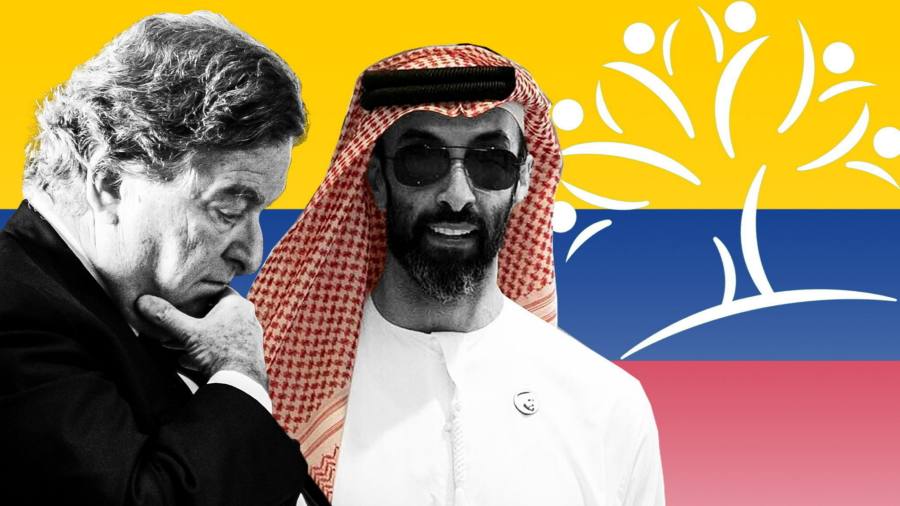Receive free Americas companies updates
We’ll send you a myFT Daily Digest email rounding up the latest Americas companies news every morning.
After a protracted battle to win control of Grupo Nutresa, Colombian billionaire Jaime Gilinski is banking that his deal partner, Abu Dhabi’s Sheikh Tahnoon bin Zayed al-Nahyan, will help turn the Latin American food company into a global player.
The 65-year-old Colombian financier, his son Gabriel and International Holding Company (IHC), an Abu Dhabi investment vehicle controlled by Sheikh Tahnoon, brother of the UAE’s ruler, outlined this month a deal whereby they will emerge as the majority owners of the Medellín-based group.
The stakebuilding campaign has been hailed as an instant bargain by analysts: the new owners spent a total of $2.7bn in eight separate share tenders over 18 months to amass their stake and Nutresa, whose products span chocolate to cold meat cut, is now valued at about $6.4bn on the Bogotá stock exchange.
Given the paper gain, Gilinski and IHC had already received approaches from potential corporate buyers in anticipation of a potential break up of the group, said a person with knowledge of the deal.
“Every major food company and M&A banker has been calling wanting to buy Nutresa since the first deal was announced. But that is not the intention. For the moment, the intention is to keep it,” the person said.
Instead, Gilinski will seek to use Sheikh Tahnoon’s web of companies to take the food group into India, Egypt or Indonesia, challenging Nestlé and Mondelez in low-to-middle income markets, according to another person directly involved in the transaction.
“Nutresa has the potential to grow from $4.5bn of sales to $10bn in two to three years via acquisitions and organic growth,” said the person, who declined to be identified because details of the partnership are confidential.
One of Nutresa’s strengths was its access to raw materials, the person said. Colombia is one of the world’s top coffee and cocoa producers and a cattle and meat exporter. Nutresa could also use Abu Dhabi’s sovereign fund ADQ’s 45 per cent stake in agricultural trader Louis Dreyfus to negotiate good terms on other commodities. ADQ is a state investment fund also chaired by Sheikh Tahnoon.
Nutresa is the latest addition to the banking-to-property empire built by Gilinski, whose wealth is estimated at $5.7bn by Forbes. His ties with Sheikh Tahnoon were visible last year when IHC, a fast-growing diversified group, invested $200mn for 49.9 per cent of Gilinski’s digital bank Lulo in Colombia.
The UAE’s national security adviser, who handles complicated relations with neighbouring powers, also oversees vast state investment holdings. As well as chairing ADQ and First Abu Dhabi Bank, the UAE’s largest lender, he was in March appointed chair of the Abu Dhabi Investment Authority, the oil-rich emirate’s $850bn sovereign wealth fund.
Javier Mejía, an economist at Stanford, said the deal had a geopolitical dimension for the Gulf.
“Nutresa is great for IHC because it diversifies the Emiratis’ . . . sources of food, which is important in the event of a political dispute or climate shock. Most of their food processing portfolio is in MENA [the Middle East and north Africa] and South Asia. Nutresa works well as a means to geographically diversify that portfolio.”
During the long Nutresa financial siege, the Gilinskis also went after two of Colombia’s other corporate crown jewels: financial conglomerate Grupo Sura and cement-to-infrastructure firm Grupo Argos.
The trio of firms was controlled by a powerful group of Medellín families known as the Grupo Empresarial Antioqueño (GEA) via a web of cross-shareholdings intended to make them impregnable to take over. The bidders launched a series of tender offers for Nutresa and Sura and built large stakes in both but fell short of the level needed to win control.
The battle turned sour, with public mudslinging and multiple lawsuits launched by both sides. The Gilinskis accused the GEA of running the companies for the benefit of the management and the controlling families at the expense of minority shareholders, while the GEA attempted to paint the bidders as corporate raiders bent on asset-stripping.
Following negotiations in Abu Dhabi and by video, a peace deal involving a share swap was agreed on May 24 in a Madrid hotel and finalised on June 16.
According to the terms, the Gilinskis and IHC will receive at least 87.1 per cent of Nutresa after surrendering their holding in Sura. Sura and Argos will give their holdings in Nutresa to the bidders and launch a tender offer to minority shareholders to reach the 87.1 per cent level. Both parties agreed to drop all outstanding litigation.
GEA executives feared losing control of the entire group and preferred to negotiate an outcome that allowed them to retain two of the three key holding companies, according to people close to the talks. They pointed out that regulators were probing whether to declare the GEA a single economic group, which could have forced either a full merger or a break up. GEA declined to comment.
Gilinski and his son Gabriel declined to comment. IHC did not respond to requests for comments.
Additional reporting by Simeon Kerr in Dubai
Read the full article here




